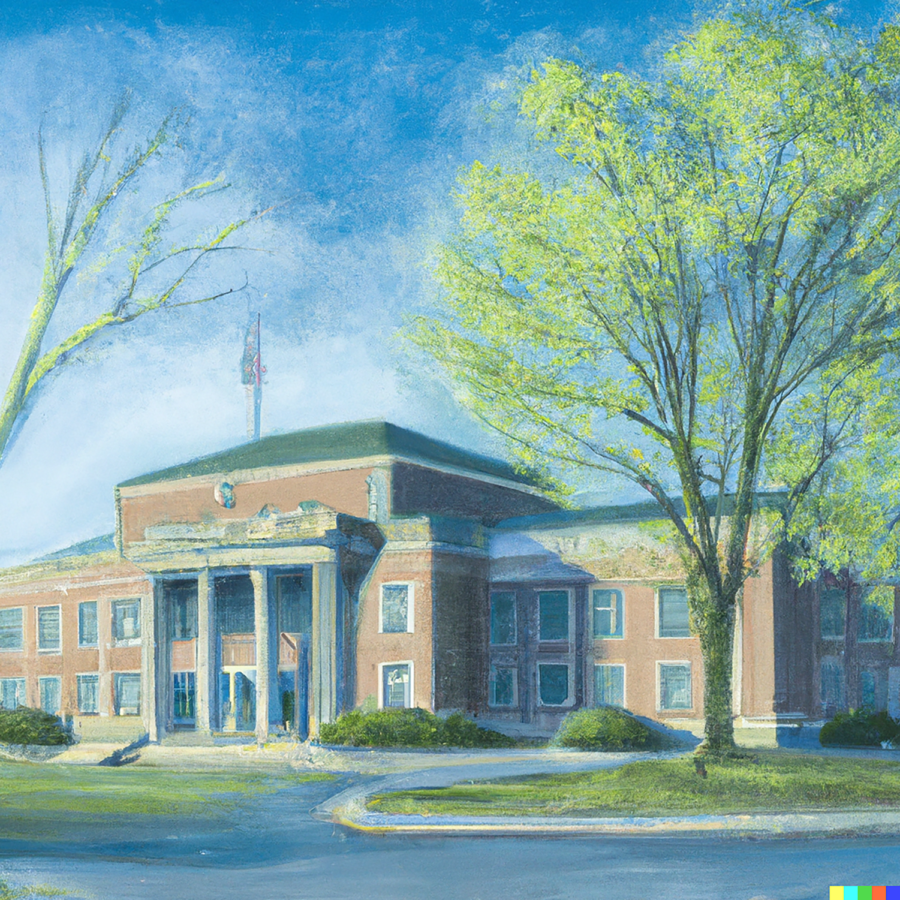Cheatbot
ChatGPT raises questions, concerns about future of education
AI generated oil painting of Monarch High School
As the use of artificial intelligence continues to expand in education, concerns have been raised about the abuse of ChatGPT as a cheating tool, with students increasingly relying on the sophisticated language model to generate plagiarized content and answer exam questions, posing significant challenges for educators tasked with maintaining academic integrity.
Wait. Stop and read that sentence again. Notice anything strange about it? Probably not. That last sentence was written by the artificial intelligence program, ChatGPT.
The use of Artificial Intelligence programs in education has become a challenge for educators. They offer new tools for learning, but also a gateway to cheating.
Language arts teacher Sean Duncan feels frustrated with students who use ChatGPT for their schoolwork.
“I despise ChatGPT. I think it’s the worst thing in the world,” Duncan said. “This is a tool where you have to do literally nothing to cheat.”
Duncan’s frustrations are shared by students and teachers alike. Owen Reid ‘23 finds ChatGPT to be an up-and-coming problem among students.
“Kids don’t realize the severity of using the AI,” Reid said. “They think it’s a nifty tool. They don’t really consider it to be plagiarizing. Kids need to learn that it’s not okay to use it.”
Say you are in a crunch the night before your big summative language arts essay is due. You can easily hop onto ChatGPT and give it one simple task:
Write me a 600 word essay about the symbolism in John Steinbeck’s Of Mice and Men.
In less than five minutes, the chatbot will generate a well written essay, and all you had to do was type one sentence.
It’s that easy.
Although Reid understands ChatGPT does not actively produce plagiarized content, he feels its use by students is a violation of academic honesty.
“If you copy and paste from Google, that’s considered plagiarism,” he said. “Whereas ChatGPT already has the text reorganized for you.”
Monarch’s Language Arts Department has its own policy regarding plagiarism on essays and other assignments with serious consequences.
It states that if a student uses words or fragments from other works and they are caught, they receive a 0% on the assignment, with the option to re-do it for a new grade of up to 50%. The student will also receive a Discipline Referral Form on their student record.
However, the current policy doesn’t include any language regarding the use of AI programs. With the rise of artificial intelligence and ChatGPT, the Language Arts department is beginning to revise their cheating policy to accommodate for the new technology, according to Duncan.
“There are AI catchers now that can supposedly identify it, but they’re not 100% accurate,” he said. “AI is constantly getting smarter, so I think it’s always going to be one step ahead of us trying to catch it.”
AI might constantly be getting more intelligent, but in Duncan’s eyes, it doesn’t make the people who use it smarter.
“I’ve heard some people try to make the argument that it’s an educational tool, and I don’t think that could be any more wrong,” Duncan said. “I think it’s only going to have bad repercussions as far as education.”
On the other side of the spectrum, Tyler Rock ‘23 feels he benefits from ChatGPT by using it as an additional source for information.
“It can scan websites and things like that so you don’t have to go read a bunch of information,” he said. “It can summarize information for you.”
Lauren Hall ‘24 also considers ChatGPT an educational tool rather than a cheating device.
“It can be helpful to kick start you into understanding whatever you’re confused about and help you to start your homework,” she said.
Social studies student teacher Daniel Petschauer notices the efficiency of ChatGPT when using it for schoolwork.
“It could save people a lot of time,” Petschauer said. “ChatGPT has a lot of potential for deceiving people, especially teachers.”
Rather than trying to keep students from using ChatGPT for work once they’re at home, something that is nearly impossible, Petschauer thinks there are more solutions to monitor its use.
“Assigning less homework and giving more in class assignments lets teachers monitor what a student is actually doing,” he said. “This is opposed to just having them go home where they can use it freely.”
There may not be a permanent way to block ChatGPT in schools, as students will almost always find ways around it. Finding alternative ways to work around the evolving system may be the only option for educators who are opposed to it.
“People are going to have to adapt for sure,” Rock said. ChatGPT could write great about anything. So there’s definitely gonna be a cultural change. I think it’s going to be something people are going to have to get used to.”



































